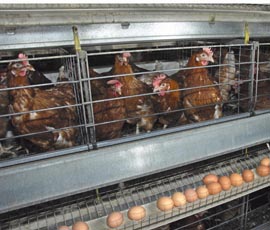Royal decree issued over cage-ban in Spain

The Spanish government has taken the unusual step of issuing a royal decree to compel farmers to report on what action they are taking to comply with the 2012 conventional cage-ban and if they require any government assistance.
In the decree the Spanish Government outlines a training and publicity initiatives to promote new methods of production to farmers and the public as well as a timeline to receive and investigate plans for conversion as well as committing €300m in loans for farmers to convert to enriched facilities.
But some industry experts doubt Spain, a nation which has an unemployment rate above 20% and a stagnant economy, can afford to pay out €300m to farmers. Others have suggested that the amount of money allocated would only be enough to assist half the Spanish egg industry to convert.
Spain has been one of the nations regularly singled out for its perceived unreadiness to comply with the approaching conventional cage-ban, with some figures saying up to 50% of producers in Spain may fail to meat the deadline. As well as Spain other nations such as Italy and Poland are expected to have conversion rates of around 50% or lower.
Compassion in World Farming (CIWF) has claimed the decree as a victory for its Europe wide campaign to push member states to show how their farmers will comply with the ban. Recently the animal welfare lobby group delivered a petition signed by 16,000 people to the Spanish Government calling for action to enforce the ban.
“It is essential that all member states demonstrate they are ready to comply with this piece of legislation, which will improve the lives of hundreds of millions of hens. With the dedication of our supporters we have managed to help persuade the Spanish government to take action, which we encourage others to follow,” said Michele Danan, Head of Public Affairs at Compassion in World Farming.
“As DEFRA tells us the UK will be fully compliant with the ban, it is important that all other EU member states are too. There are still a small number of countries, France and Italy for instance, which are lagging behind and we will be working tirelessly to ensure they too comply with the legislation when it comes into force in January.”
British Egg Information Service spokesperson Amanda Cryer said they hoped this action by Spain heralded the start of a movement across Europe to secure compliance.
“We think it is a very interesting development and we hope other countries will follow suit and take steps to make sure the regulation will be enforced in the same way it will be enforced in the UK,” she said.
According to recent figures up to 29% of the EU flock will be non-compliant with the legislation when it comes into force on January 1 2012.
